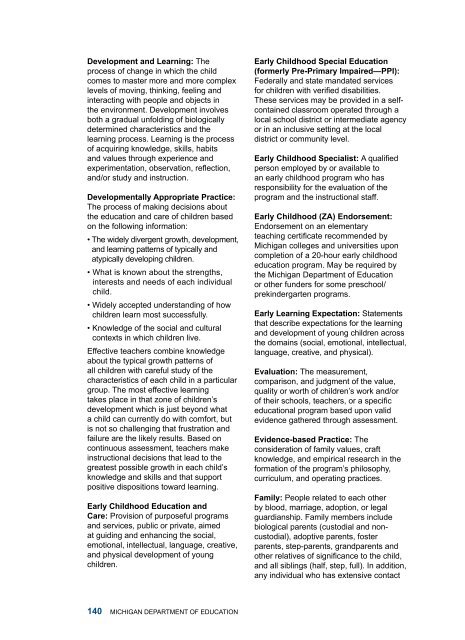Early Childhood Standards of Quality for ... - State of Michigan
Early Childhood Standards of Quality for ... - State of Michigan
Early Childhood Standards of Quality for ... - State of Michigan
You also want an ePaper? Increase the reach of your titles
YUMPU automatically turns print PDFs into web optimized ePapers that Google loves.
Development and Learning: Theprocess <strong>of</strong> change in which the childcomes to master more and more complexlevels <strong>of</strong> moving, thinking, feeling andinteracting with people and objects inthe environment. Development involvesboth a gradual unfolding <strong>of</strong> biologicallydetermined characteristics and thelearning process. Learning is the process<strong>of</strong> acquiring knowledge, skills, habitsand values through experience andexperimentation, observation, reflection,and/or study and instruction.Developmentally Appropriate Practice:The process <strong>of</strong> making decisions aboutthe education and care <strong>of</strong> children basedon the following in<strong>for</strong>mation:• The widely divergent growth, development,and learning patterns <strong>of</strong> typically andatypically developing children.• What is known about the strengths,interests and needs <strong>of</strong> each individualchild.• Widely accepted understanding <strong>of</strong> howchildren learn most successfully.• Knowledge <strong>of</strong> the social and culturalcontexts in which children live.Effective teachers combine knowledgeabout the typical growth patterns <strong>of</strong>all children with careful study <strong>of</strong> thecharacteristics <strong>of</strong> each child in a particulargroup. The most effective learningtakes place in that zone <strong>of</strong> children’sdevelopment which is just beyond whata child can currently do with com<strong>for</strong>t, butis not so challenging that frustration andfailure are the likely results. Based oncontinuous assessment, teachers makeinstructional decisions that lead to thegreatest possible growth in each child’sknowledge and skills and that supportpositive dispositions toward learning.<strong>Early</strong> <strong>Childhood</strong> Education andCare: Provision <strong>of</strong> purposeful programsand services, public or private, aimedat guiding and enhancing the social,emotional, intellectual, language, creative,and physical development <strong>of</strong> youngchildren.<strong>Early</strong> <strong>Childhood</strong> Special Education(<strong>for</strong>merly Pre-Primary Impaired—PPI):Federally and state mandated services<strong>for</strong> children with verified disabilities.These services may be provided in a selfcontainedclassroom operated through alocal school district or intermediate agencyor in an inclusive setting at the localdistrict or community level.<strong>Early</strong> <strong>Childhood</strong> Specialist: A qualifiedperson employed by or available toan early childhood program who hasresponsibility <strong>for</strong> the evaluation <strong>of</strong> theprogram and the instructional staff.<strong>Early</strong> <strong>Childhood</strong> (ZA) Endorsement:Endorsement on an elementaryteaching certificate recommended by<strong>Michigan</strong> colleges and universities uponcompletion <strong>of</strong> a 20-hour early childhoodeducation program. May be required bythe <strong>Michigan</strong> Department <strong>of</strong> Educationor other funders <strong>for</strong> some preschool/prekindergarten programs.<strong>Early</strong> Learning Expectation: <strong>State</strong>mentsthat describe expectations <strong>for</strong> the learningand development <strong>of</strong> young children acrossthe domains (social, emotional, intellectual,language, creative, and physical).Evaluation: The measurement,comparison, and judgment <strong>of</strong> the value,quality or worth <strong>of</strong> children’s work and/or<strong>of</strong> their schools, teachers, or a specificeducational program based upon validevidence gathered through assessment.Evidence-based Practice: Theconsideration <strong>of</strong> family values, craftknowledge, and empirical research in the<strong>for</strong>mation <strong>of</strong> the program’s philosophy,curriculum, and operating practices.Family: People related to each otherby blood, marriage, adoption, or legalguardianship. Family members includebiological parents (custodial and noncustodial),adoptive parents, fosterparents, step-parents, grandparents andother relatives <strong>of</strong> significance to the child,and all siblings (half, step, full). In addition,any individual who has extensive contact140 <strong>Michigan</strong> Department <strong>of</strong> Education


